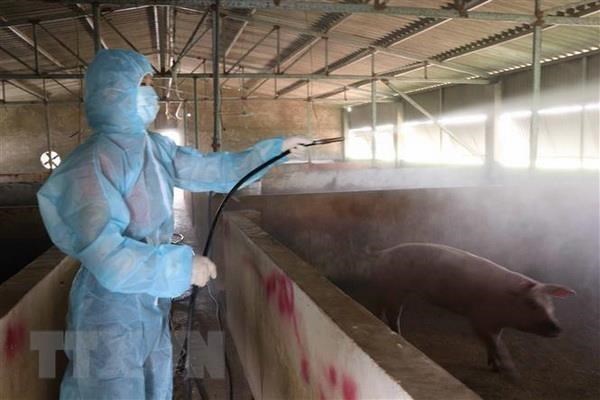Viet Nam develops anti-African swine fever vaccine
A vaccine against African swine fever (AFS) virus by the Viet Nam Academy of Agricultural Sciences (VAAS) has produced initial positive outcomes on experimental scale, unveiled Minister of Agriculture and Rural Development (MARD) Nguyen Xuan Cuong.
 |
| A farmer sterilises her pig farm. (Photo: VNA) |
Mr Cuong released the information at a conference held by the ministry on July 2 to review research outcomes of tested vaccines and probiotics to prevent and curb AFS so far.
He noted that the NAVETCO National Veterinary JSC and Regional Animal Health Office No.6 (RAHO6) have jointly carried out several researches.
He said the RAHO6 has so far collected samples of infected pigs surviving the disease, meaning there could be a type of pig that is able to adapt to the virus. The sample will be sent to international animal health organisations for further research.
These measures are on the right track and Viet Nam is likely to soon produce the vaccine for AFS, Cuong stated.
Nguyen Thi Lan, director of the VAAS, said its research teams have created a new vaccine that has been piloted in three pig farms in Hung Yen, Ha Nam and Thai Binh provinces.
Of the total vaccinated animals, 16 out of 18 sows and all 15 pigs for meat are in healthy condition after two months, with some of the sows giving birth to healthy piglets. Meanwhile, all unvaccinated pigs have died of AFS virus infection.
Lan said the vaccine is tested to be safe for the animal.
Nguyen Xuan Duong, head of the Department of Livestock Production, said the use of probiotics in animal feed and of biosafety measures could limit the spread of AFS disease among farms.
Such measures have been applied in farms with scales of up to 500 heads.
He recommended the MARD and localities come up with policies to encourage the replication of the probiotics and biosafety application in pig production.
The AFS disease, first discovered in Hung Yen on February 1 this year, has to date spread to 61 provinces and cities nationwide. As a result, more than 2.9 million pigs or 10 percent of the country’s pig population were culled. The risk of future outbreaks remains high, posing a big threat to the industry.
(Source: VNA)